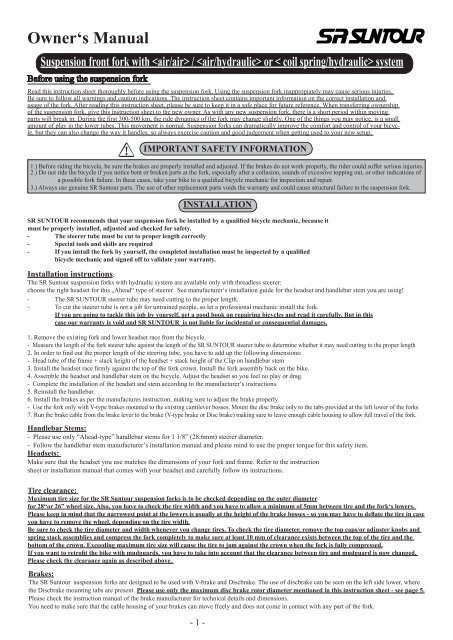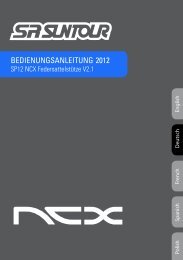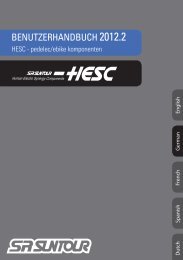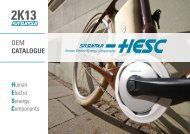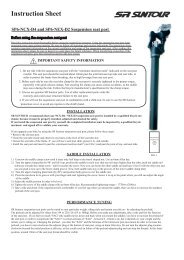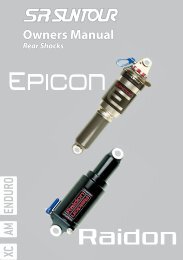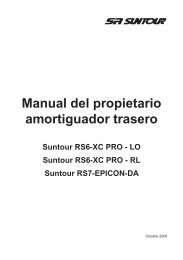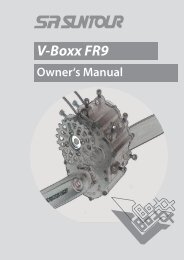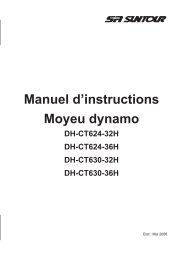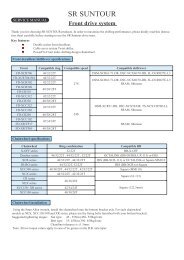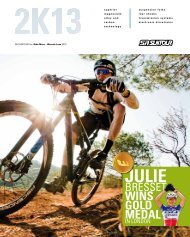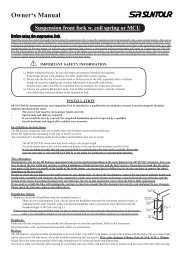Owner's Manual - dbap GmbH
Owner's Manual - dbap GmbH
Owner's Manual - dbap GmbH
You also want an ePaper? Increase the reach of your titles
YUMPU automatically turns print PDFs into web optimized ePapers that Google loves.
Owner‘s <strong>Manual</strong><br />
Suspension front fork with / or < coil spring/hydraulic> system<br />
Read this instruction sheet thoroughly before using the suspension fork. Using the suspension fork inappropiately may cause serious injuries.<br />
Be sure to follow all warnings and caution indications. The instruction sheet contains important information on the correct installation and<br />
usage of the fork. After reading this instruction sheet, please be sure to keep it in a safe place for future reference. When transferring ownership<br />
of the suspension fork, give this instruction sheet to the new owner. As with any new suspension fork, there is a short period within moving<br />
parts will break in. During the first 300-500 km, the ride dynamics of the fork may change slightly. One of the things you may notice, is a small<br />
amount of play in the lower tubes. This movement is normal. Suspension forks can dramatically improve the comfort and control of your bicycle,<br />
but they can also change the way it handles, so always exercise caution and good judgement when getting used to your new setup.<br />
IMPORTANT SAFETY INFORMATION<br />
1.) Before riding the bicycle, be sure the brakes are properly installed and adjusted. If the brakes do not work properly, the rider could suffer serious injuries.<br />
2.) Do not ride the bicycle if you notice bent or broken parts at the fork, especially after a collusion, sounds of excessive topping out, or other indications of<br />
a possible fork failure. In these cases, take your bike to a qualified bicycle mechanic for inspection and repair.<br />
3.) Always use genuine SR Suntour parts. The use of other replacement parts voids the warranty and could cause structural failure to the suspension fork.<br />
INSTALLATION<br />
SR SUNTOUR recommends that your suspension fork be installed by a qualified bicycle mechanic, because it<br />
must be properly installed, adjusted and checked for safety.<br />
- The steerer tube must be cut to proper length correctly<br />
- Special tools and skills are required<br />
- If you install the fork by yourself, the completed installation must be inspected by a qualified<br />
bicycle mechanic and signed off to validate your warranty.<br />
Installation instructions:<br />
The SR Suntour suspension forks with hydraulic system are available only with threadless steerer:<br />
choose the right headset for this „Ahead“ type of steerer. See manufacturer‘s installation guide for the headset and handlebar stem you are using!<br />
- The SR SUNTOUR steerer tube may need cutting to the proper length.<br />
- To cut the steerer tube is not a job for untrained people, so let a professional mechanic install the fork.<br />
If you are going to tackle this job by yourself, get a good book on repairing bicycles and read it carefully. But in this<br />
case our warranty is void and SR SUNTOUR is not liable for incidental or consequential damages.<br />
1. Remove the existing fork and lower headset race from the bicycle.<br />
- Measure the length of the fork steerer tube against the length of the SR SUNTOUR steerer tube to determine whether it may need cutting to the proper length<br />
2. In order to find out the proper length of the steering tube, you have to add up the following dimensions:<br />
- Head tube of the frame + stack height of the headset + stack height of the Clip on handlebar stem<br />
3. Install the headset race firmly against the top of the fork crown. Install the fork assembly back on the bike.<br />
4. Assemble the headset and handlebar stem on the bicycle. Adjust the headset so you feel no play or drag.<br />
- Complete the installation of the headset and stem according to the manufacturer‘s instructions.<br />
5. Reinstall the handlebar.<br />
6. Install the brakes as per the manufactures instruction, making sure to adjust the brake properly.<br />
- Use the fork only with V-type brakes mounted to the existing cantilever bosses. Mount the disc brake only to the tabs provided at the left lower of the forks<br />
7. Run the brake cable from the brake lever to the brake (V-type brake or Disc brake) making sure to leave enough cable housing to allow full travel of the fork.<br />
Handlebar Stems:<br />
- Please use only “Ahead-type” handlebar stems for 1 1/8” (28.6mm) steerer diameter.<br />
- Follow the handlebar stem manufacturer’s installation manual and please mind to use the proper torque for this safety item.<br />
Headsets:<br />
Make sure that the headset you use matches the dimensions of your fork and frame. Refer to the instruction<br />
sheet or installation manual that comes with your headset and carefully follow its instructions.<br />
Tire clearance:<br />
Maximum tire size for the SR Suntour suspension forks is to be checked depending on the outer diameter<br />
for 28“or 26” wheel size. Also, you have to check the tire width and you have to allow a minimum of 5mm between tire and the fork‘s lowers.<br />
Please keep in mind that the narrowest point at the lowers is usually at the height of the brake bosses - so you may have to deflate the tire in case<br />
you have to remove the wheel, depending on the tire width.<br />
Be sure to check the tire diameter and width whenever you change tires. To check the tire diameter, remove the top caps/or adjuster knobs and<br />
spring stack assemblies and compress the fork completely to make sure at least 10 mm of clearance exists between the top of the tire and the<br />
bottom of the crown. Exceeding maximum tire size will cause the tire to jam against the crown when the fork is fully compressed.<br />
If you want to retrofit the bike with mudguards, you have to take into account that the clearance between tire and mudguard is now changed.<br />
Please check the clearance again as described above.<br />
Brakes:<br />
The SR Suntour suspension forks are designed to be used with V-brake and Discbrake. The use of discbrake can be seen on the left side lower, where<br />
the Discbrake mounting tabs are present. Please use only the maximum disc brake rotor diameter mentioned in this instruction sheet - see page 5.<br />
Please check the instruction manual of the brake manufacturer for technical details and dimensions.<br />
You need to make sure that the cable housing of your brakes can move freely and does not come in contact with any part of the fork.<br />
- 1 -
MOUNTING AND OPERATING THE REMOTE LOCK-OUT CONTROL<br />
Mounting of the remote lock-out single lever<br />
You have the choice of two remote speed lock controls, depending on the drive<br />
train and drive train shifter types you are using.<br />
Note: The speed lock cartridge is located on the right side of the fork.<br />
RIGHT AND LEFT SIDE ARE REFERRED IN TRAVEL DIRECTION!<br />
If you have a fork with air cartridge on the other side, please use the setting<br />
of the air pressure chart on shown on the air cartridge setting page<br />
1.) If you use „Rapid Fire“ type of shifters you have to use the single remote<br />
lock-out lever included in the fork set (see photo #1).<br />
a.) Mount first the remote lock-out lever on the handlebar. Use a 2.5mm Allen<br />
key for fastening of the lever bracket (see #1). The position of the (upper) lock<br />
lever should be parallel to the ground - so you push vertically downwards.<br />
b.) Choose the right length of outer casing, in order to allow the unrestricted<br />
function of the fork.<br />
c.) Turn the cable tension adjustment barrel two turns counter-clockwise (#3)in<br />
order to have adjustment clearance for the lock-out adjustment function.<br />
d.) Remove the plastic cover in order to access the cable fixing bolt (#4)<br />
Thread the cable through the outer casing stopper and trough the cover cap<br />
hole and tension the cable lightly. Tighten the fixing screw using a 1.5mm<br />
Allen key(#4).<br />
e.) Cut the cable and replace the plastic cover you removed at start(#7).<br />
f,) Now push the lever to the lock position(see photo # 5) in order to lock the<br />
fork. Check if the fork is now locked, by pushing down the handlebar. If not,<br />
you have to adjust the tension of the cable.To unlock the fork, push the red<br />
release lever in riding direction (#6) and check if the fork is now unlocked.<br />
Mounting of the remote lock-out twist grip<br />
a.) Mount first the remote lock-out grip on the handlebar. Use a 3mm Allen key<br />
for fastening of the bracket (see #8). After that, you can mount the brake lever<br />
and the shifting levers.<br />
b.) Choose the right length of outer casing, in order to allow the unrestricted<br />
function of the fork.<br />
c.) Turn the cable tension adjustment barrel two turns counter-clockwise<br />
(#12)in order to have adjustment clearance for the lock-out adjustment function.<br />
d.) In order to insert the cable, you have to remove the plastic cover from the<br />
twist-grip control, using a cross or slot screwdriver(#9).<br />
e.) Check if the control is turned in the un-lock position in order to access the<br />
cable insert hole. You can use a standard shifting cable with cylindrical nipple.<br />
Thread the cable through the hole(#10) and route it along the guiding groove<br />
in the control(#11), until the cable comes out at the cable tension adjustment<br />
barrel.<br />
f.) Replace the plastic cover on the twist-grip control and fasten the fixing<br />
screw, using again the cross or slot screwdriver.<br />
g.) Now, you can fasten the cable at the lock-out unit at the fork.<br />
Remove the plastic cover in order to access the cable fixing bolt (#4)<br />
Thread the cable through the outer casing stopper and trough the cover cap<br />
hole and tension the cable lightly. Tighten the fixing screw using a 1.5mm<br />
Allen key(#5).<br />
h.) Cut the cable(#6) and replace the plastic cover you removed at start.<br />
i.) Now turn the grip to the lock position(see photo # 14) in order to lock the<br />
fork. Check if the fork is now locked, by pushing down the handlebar. If not,<br />
you have to adjust the tension of the cable(#12).To unlock the fork, turn the<br />
grip to the front and check if the fork is now unlocked.<br />
Lock-out function setting<br />
a.) If the cable tension is too high, the lock-out lever or twist-grip will not<br />
stay engaged and keep the fork in locked position. In such case, decrease the<br />
cable tension by turning the adjustment barrel (#3/12) clockwise (-), until the<br />
lever will stay engaged.<br />
b.) If the cable tension is too low, then the fork will not be locked when you<br />
engage the lever/twist-grip. In order to increase the cable tension, turn the<br />
adjustment barrel counter-clockwise (+), until the fork will stay locked and the<br />
lever/twist-grip is still engaged.<br />
c.) In case you cannot adjust the fork using the adjustment barrel, you have to<br />
open the cable fixing screw, clamp the cable again and increase or decrease<br />
the cable tension at this point (see #5). After that, you can make the fine tuning<br />
again as described at a.) and b.).<br />
- 2 -<br />
Fixing bolt. Use a 2.5mm Allen key.<br />
Lock lever push<br />
position - parallel<br />
to the ground!<br />
Decrease<br />
tension.<br />
Increase<br />
tension.<br />
Cable nipple. Shifting cable type.<br />
1 2<br />
3<br />
Cable tension adjustment barrel.<br />
The RL lever is to be mounted on the right side of the handlerbar!<br />
Lock lever push<br />
direction - vertical to the<br />
ground!<br />
7<br />
9 10<br />
11<br />
Cable guide groove<br />
90°<br />
90°<br />
Ground<br />
Cable<br />
nipple<br />
5<br />
Red release lever push<br />
direction - horizontal to the<br />
ground - in riding direction!<br />
8<br />
Cable tension adjustment barrel.<br />
12<br />
Less<br />
tension.<br />
Twist grip fixing<br />
bolt - 3mm Allen.<br />
Cable nipple. Shifting cable type.<br />
More<br />
tension.<br />
13 14<br />
4<br />
6
Mounting of the remote travel adjuster control<br />
You have the choice of two remote travel adjuster controls, depending on the<br />
drive train and shifter types you are using.<br />
There is the single lever, shown in picture #1 and there is a combined travel<br />
adjust lever and remote lock-out twist grip available - see picture #11.<br />
Note: The travel adjustment cartridge is located on the left side of the fork.<br />
1.) If you use „Rapid Fire“ type of shifters you have to use the single remote<br />
travel adjuster lever included in the fork set (see photo # 1).<br />
a.) Mount first the remote travel adjustment lever on the handlebar. Use a 3mm<br />
Allen key for fastening of the lever bracket (see # 1). After that, you can mount<br />
the brake lever and the shifting levers.<br />
b.) Choose the right length of outer casing, in order to allow the unrestricted<br />
function of the fork.<br />
c.) Turn the cable tension adjustment barrel (see # 3) two turns counter-clockwise<br />
in order to have adjustment clearance for the travel adjustment function.<br />
d.) At the suspension fork, remove the plastic cover cap from the travel adjust<br />
unit, using a 2.5mm Allen key(#4). Thread the cable through the outer casing<br />
stopper and through the cable clamp(#5). and push the outer casing cap firmly<br />
in the outer casing stopper.<br />
e.) Tension the cable lightly and clamp the cable firmly with the fixing bolt,<br />
using a cross or slot screwdriver(#6).<br />
f,) Cut the cable to size(#7) and replace the plastic cover, fixing it with the<br />
Allen screw, using a 2.5mm Allen key(#8).<br />
g.) At the cable end, please attach a cable end cap for your protection(#9).<br />
h, Now press the lever(#10) and at the same time push down on the handlebar<br />
in order to compress the fork. At the end of this movement, release the lever<br />
and then the handlebar. Check if the fork stays in that position. If not, then you<br />
have to adjust the tension of the cable. To release the fork from that position,<br />
push the lever again and pull the handlebar.<br />
Travel adjustment setting<br />
a.) If the cable tension is too low, then the fork will not stay in the preselected<br />
position after you release the lever. In order to increase the cable tension, turn<br />
the adjustment barrel(#3) counter-clockwise (+), until the fork will stay in the<br />
preselected position.<br />
c.) In case you cannot adjust the fork using the adjustment barrel, you have to<br />
open the cable clamping screw and increase or decrease the cable tension at<br />
this point. After that, you can make the fine tuning again as described at a.).<br />
Air pressure adjustment<br />
In case it is necessary to increase or decrease the air pressure in the travel<br />
adjustment cartridge, please proceed after the following steps:<br />
a.) At the dropout level of the travel adjust cartridge side, there is the air valve<br />
for the travel adjust cartridge. Remove the air valve cover cap (see # 12).<br />
b.) Using a fork pump with pressure gauge, increase or decrease the air pressure<br />
in accordance with the chart displayed below.<br />
Rider<br />
weight<br />
MOUNTING AND OPERATING THE REMOTE TRAVEL ADJUST CONTROL<br />
AIR PRESSURE CHART<br />
Air<br />
pressure<br />
left side<br />
Air<br />
pressure<br />
right side<br />
lb. kg psi kgf/cm² psi kgf/cm²<br />
80 36 62 4,3 15 1,1<br />
100 45 77 5,4 19 1,4<br />
120 54 93 6,5 23 1,6<br />
140 64 110 7,7 27 1,9<br />
160 73 125 8,8 31 2,2<br />
180 82 141 9,8 35 2,5<br />
200 91 156 10,9 39 2,7<br />
220 100 171 12,0 43 3,0<br />
NOTE: The left side pressure is referring to the travel adjust cartridge.<br />
The right side pressure you need in case of an air system on the fork‘s right side.<br />
- 3 -<br />
1<br />
Fixing bolt. Use a 3mm Allen key.<br />
Decrease<br />
tension.<br />
Increase<br />
3 tension.<br />
4<br />
Cable nipple. Shifting cable type.<br />
Cable tension adjustment barrel.<br />
The TA lever is to be mounted on the left side of the handlerbar!<br />
5 6<br />
7 8<br />
9 10<br />
11 12<br />
Air valve<br />
cover cap<br />
Push the lever in order to ajust the travel.<br />
Cover cap and valve of the air spring system side of the fork<br />
2
Use and function of the lock-out system<br />
The lock-out function of the SR Suntour forks is intended to reduce bobbing<br />
during your sprinting action or uphill ride. The fork will not be as hard as a<br />
rigid fork, if you press with your full weight on the handlebar, but you will<br />
feel a big difference between locked and un-locked mode. In order to activate<br />
this function, you have either to push the “wishbone” shaped lever to the right<br />
- in case of a remote lock-out fork or to turn the lock-out knob located on the<br />
right side of the fork crown clockwise up to stop. In order to open the system<br />
for normal damping, you have to push the “wishbone” lever to the left in the<br />
case of a remote lock-out fork or turn the lock-out knob counter-clockwise.<br />
To perform both functions - lock or un-lock -> you need only one flip of your<br />
thumb in the case of the remote lock-out fork or a full turn of the lock-out<br />
knob for a standard lock-out fork.<br />
Note: The Lock-out cartridge is located on the right side of the fork.<br />
Warning: Please don‘t use the fork in lock-out mode when riding on rough<br />
terrain or jumping. High load under lock-out condition might lead to a<br />
certain damage which may result into breakage of the RL/LO cartridge“<br />
Adjustment of the lock-out system for MTB forks<br />
OPERATING THE MANUAL LOCK-OUT SYSTEM<br />
1.)Adjustment for the case the fork still moves hard in the fully unlocked<br />
position<br />
In the fully opened (fast) position of the lock-out knob, you have to pull up<br />
the knob, move it clockwise for about 45° and insert it back into the top cap.<br />
As such, you gain 45° up to the stopper position and you can un-lock more<br />
the cartridge. After this step, check again the function. Please check also, if<br />
the system is locking when you turn the knob to the "lock" direction until the<br />
stopper tab. (See movement from picture #3 and #4)<br />
2.)Adjustment for the case the fork is still un-locked in the fully locked<br />
position<br />
In the fully closed (lock) position of the lock-out knob, you have to pull up the<br />
knob, move it counter-clockwise for about 45° and insert it back into the top<br />
cap. As such, you gain 45° up to the stopper position and you can lock more<br />
the cartridge. After this step, check again the function. Please check also, if the<br />
system is un-locking when you turn the knob to the "fast" direction until the<br />
stopper tab (see movement from picture #5 and #6).<br />
Use and function of the hydraulic rebound damping<br />
The rebound damping function of the SR Suntour hydraulic forks is intended<br />
to allow you to tune your fork‘s rebound speed to you personal preferences and<br />
the terrain you‘re riding.<br />
Increase rebound speed<br />
In order to increase the speed of the rebound, you have to turn the adjustment<br />
knob located at the level of the right dropout counter-clockwise (see #7).In<br />
case the rebound speed is still too slow for you, you may go to a authorized<br />
local dealer and ask him to exchange the standard fork oil we use (5W) to a oil<br />
with lower viscosity (for example 2.5W)<br />
Decrease rebound speed<br />
In order to decrease the speed of the rebound and make it slower, you have to<br />
turn the adjustment knob clockwise (see #8).<br />
Use and function of the coil spring preload adjusters<br />
The preload adjustment of the SR Suntour forks is intended to allow you to<br />
tune your fork‘s „SAG“ to you personal weight. The „SAG“ is the amount of<br />
travel the fork compresses when you sit up your bike.<br />
Reduce SAG<br />
In order to reduce SAG, you have to turn the preload adjuster knob clockwise<br />
(see #9). While you do so, the yellow marker in the transparent window will<br />
move down (see # 10). The fork is delivered set at minimum preload.<br />
Increase SAG<br />
In order to increase SAG, if you adjusted the preload of the coil spring too<br />
high, you have to turn the preload adjuster knob counter-clockwise.<br />
While you do so, the yellow marker in the transparent window will move up.<br />
For the proper amount of SAG, please see „Fork performance tuning“ - page 5.<br />
- 4 -<br />
1<br />
3 4<br />
5 6<br />
OPERATING THE HYDRAULIC REBOUND DAMPING<br />
7 8<br />
OPERATING THE COIL SPRING PRELOAD ADJUSTERS<br />
9 10<br />
Stopper<br />
tab.<br />
2
Use and function of the remote travel adjustment<br />
This feature allows you to adjust the travel of your fork depending on your preferences and the terrain you’re riding.<br />
The travel adjustment allows you to change the way the bike handles, when you ride uphill or downhill.<br />
When you ride uphill, you push the lever (which is mounted on the handlebar) and push down the handlebar.<br />
You release the lever at the desired travel level of the fork. Now you can ride uphill in a more comfortable body position.<br />
When you ride downhill, you push the lever and pull the handlebar and the fork extends its travel to the maximum<br />
travel level. Now you can ride downhill in a more comfortable and safer body position.<br />
The infinitely variable travel can be adjusted from 60-120mm (130mm - depending on the fork model) steplessly.<br />
Remark: The changement of the travel of the fork doesn’t change the air spring rate.<br />
You have the same comfort at all travel levels.<br />
Remote<br />
Lock-out<br />
System<br />
SF7-AXON RLD<br />
SF7-EPICON RLD<br />
SF7-NRX-RLD<br />
Lock-out<br />
Rebound<br />
adjuster<br />
Rebound<br />
adjuster<br />
OPERATING THE REMOTE TRAVEL ADJUSTMENT<br />
OVERVIEW OF THE FORK SYSTEMS REFERRED TO IN THIS MANUAL<br />
AIR<br />
System<br />
Air system<br />
SF7-EPICON-LOD<br />
Open<br />
oil bath +<br />
rebound adj.<br />
Open oil<br />
bath + coil<br />
spring<br />
Remote<br />
Lock-out<br />
System<br />
Preload<br />
adjustment<br />
by air<br />
Damping<br />
adjuster<br />
Open oil<br />
bath + coil<br />
spring<br />
SF7-RUX-S<br />
Travel<br />
adjust<br />
SF7-XC-PRO-TA<br />
Coil<br />
spring<br />
AXON-D-RL<br />
Open oil<br />
bath + coil<br />
spring<br />
SF7-XC-PRO-TAD<br />
Remote<br />
Lock-Out<br />
System<br />
- 5 -<br />
Rebound<br />
adjuster<br />
Remote<br />
Travel<br />
Adjuster<br />
AIR<br />
System<br />
SF7-EPICON-RL<br />
Coil<br />
spring<br />
Travel<br />
adjust<br />
SF7-XCR-TA<br />
Open oil<br />
bath + coil<br />
spring<br />
SF7-DURO-DJ-E<br />
SF7-DURO-DJ-D<br />
Lock-out<br />
Rebound<br />
adjuster<br />
Coil<br />
spring<br />
Coil<br />
spring<br />
SF7-XCR-LO<br />
Open oil<br />
bath + coil<br />
spring<br />
Rebound<br />
adjuster<br />
Air system<br />
SF7-EPICON-DA<br />
Max. possible discbrake<br />
rotor diameter:<br />
SF7-DURO DJ = 210mm<br />
SF7-RUX = 210 mm<br />
SF7-XC-PRO = 185mm<br />
SF7-AXON = 185mm<br />
SF7-EPICON = 185mm<br />
SF7-XCR = 185mm<br />
SF7-XCM = 185mm<br />
SF7-NRX = 185mm<br />
SF7-NCX = 185mm<br />
Fork<br />
Crown<br />
Stanchion<br />
Fork<br />
lowers<br />
Dropout<br />
Rebound<br />
adjuster<br />
Steerer<br />
NOTE: Your fork‘s apperance may<br />
vary from the images shown in this<br />
Owner‘s manual.<br />
For latest information please visit our<br />
website:<br />
WWW.SRSUNTOUR-CYCLING.COM
Fork performance tuning<br />
The SR Suntour suspension forks can be tuned for your particular weight, in accordance with the terrain and your personal riding style.<br />
Setting Sag<br />
Suspension forks will sag(dive in) more or less, depending on your weight and fork setting, when you mount the saddle and sit on your bike.<br />
The proper adjustment of sag allows the front wheel to keep contact with the ground during the ride. Sag is adjusted byincreasing or decreasing<br />
(depending of the fork model) the:<br />
a.) the positive air pressure / b.) the preload on the spring stacks.<br />
Travel Intended use Sag<br />
80 mm Racing 8-12 mm<br />
80 mm XC 12-16 mm<br />
100 mm Racing 10-14 mm<br />
100 mm XC 14-18mm<br />
130 mm Freeride 20-25mm<br />
a.) Setting SAG by air pressure<br />
In order to adjust the air pressure, please be sure to use the following steps<br />
(Right and left side are to be considered from the rider’s perspective):<br />
1.) unscrew by hand the cover cap on the left or right side of the fork crown.<br />
In case of a travel adjustment fork, please find the air valve at the left lower dropout..<br />
2.) attach the suspension fork air pump at the “Schrader” valve.<br />
3.) pump up the fork to the desired hardness level -> see chart.<br />
4.) remove the pump from the valve.<br />
5.) replace the cover cap.<br />
b.) Setting SAG by spring preload<br />
FORK PERFORMANCE TUNING<br />
In order to adjust the Sag by spring preload, measure first - as described above - the initial Sag, using the zip tie method.<br />
After you found out the amount of Sag you have, reduce or increase it, by using the preload knob on the top of the fork crown.<br />
By turning the preload knob clockwise, you increase the preload and reduce the SAG.<br />
By turning the preload knob counter-clockwise, you reduce the preload and increase the SAG. Please adjust the SAG in accordance with your personal preferences<br />
and use the values indicated above as guidance. If you are not able to adjust the optimum SAG, you need to change the fork‘s coil springs, to harder or softer ones.<br />
2007 models chart information upon oil amount (CC) and air pressure (PSI)<br />
- 6 -<br />
To measure the amount of sag your fork is diving in, install a zip tie on the<br />
stanchion tube, at the level of the lower tube seal.<br />
Now, mount the saddle and sit on the bike in normal riding position, ride a short<br />
distance on flat ground and step off the bike.<br />
Measure the distance between the lower seal and the zip tie and you will find out the<br />
sag. In case of travel adjustment forks,<br />
set the fork to maximum travel (120mm) and check in accordance with the chart<br />
shown above.<br />
AIR SPRING SYSTEM TRAVEL ADJUST SYSTEM<br />
Model type travel (mm) left right viscosity left right<br />
SF7 Rux S open bath 130 & 150 150cc 120cc 10W 15psi no<br />
SF7 Rux E open bath 130 & 150 150cc 120cc 10W 15psi no<br />
SF7 Duro DJ E semi-cartridge 80, 100 & 130 80cc no oil 10W no no<br />
SF7 Duro DJ D semi-cartridge 80, 100 & 130 80cc no oil 10W no no<br />
SF7 Duro D semi-cartridge 100 & 130 80cc no oil 5W no no<br />
SF7 Xcpro TAD semi-cartridge 140-60 90cc no oil 5W 120psi no<br />
SF7 Axon RLD semi-cartridge 80 & 100 75cc no oil 10W 110psi no<br />
SF7 Epicon RLD semi-cartridge 80, 100, 120 & 140 85cc no oil 10W 120psi no<br />
SF7 Epicon RL semi-cartridge 80, 100, 120 & 140 85cc no oil 10W 120psi no<br />
SF7 Epicon LOD semi-cartridge 80, 100, 120 & 140 85cc no oil 10W 120psi no<br />
SF7 Epicon DA semi-cartridge 80, 100, 120 & 140 85cc no oil 10W 120psi no<br />
SF7 NRX RLD semi-cartridge 63 & 75 45cc no oil 10W 100psi no<br />
SF7 NRX RL semi-cartridge 63 & 75 45cc no oil 10W 100psi no<br />
SF7 NRX DA semi-cartridge 63 & 75 45cc no oil 10W 100psi no<br />
SF7 NCX-FT-S-RL 63 100psi no<br />
SF7 NCX-FT-E-RL 63 100psi no<br />
SF7 NCX-S-RL 63 100psi no<br />
SF7 NCX-E-RL 63 100psi no<br />
SF7 CR990-LO 63 100psi no
MAINTENANCE<br />
Check the fork before each ride and contact your dealer if you have any questions.<br />
Check following points:<br />
a) Visible damage of the fork - on upper or lower tubes, fork crown, brace, dropouts - like cracks, dents, as effects of a crash during<br />
the ride or of other causes.<br />
b) Tightness of the headset by pressing the braking lever of the front brake and pushing and pulling the bike in order to see if there is play.<br />
c) Brake pad adjustment on the rim and distance to the rim ( 1-2 mm is optimal)<br />
d) Brake lever travel - ideally the contact of the brake pad and rim should occur after 1/3 of lever travel range<br />
e) Firmness of the brake assembly - apply the brakes several times and check carefully for loose nuts, bolts, etc.<br />
f) Front wheel must be centred within the fork tubes. Check proper torque on wheel quick release mechanism.<br />
Maintenance<br />
SR SUNTOUR forks are designed to be nearly maintenance free. However, as long as moving parts are exposed to<br />
moisture and contamination, performance may be reduced. To maintain high performance, safety and long life, periodic<br />
maintenance is required.<br />
The recommended intervals for maintenance are listed below.<br />
Lubricants and Cleaners:<br />
- Teflon fortified oil<br />
- SR SUNTOUR special grease (SRS No.9170-001) / high quality Teflon fortified grease.<br />
Damping oil:<br />
- SR SUNTOUR special damping oil (SR SUNTOUR special damper oil #PSF01-033 / Viscosity 5W).<br />
Regular Maintenance:<br />
Before every ride, inspect the following parts:<br />
a) Front wheel and quick release for proper installation and adjustment<br />
b) Fork for any obvious damage (crown, brace, upper tubes, lower tubes, and dropouts)<br />
c) Front brake cable for proper routing<br />
d) Front brake pads for proper contact with the rim / wear down of disc brake pads<br />
e) Front brake lever for proper adjustment and function<br />
f) Headset for proper function and adjustment<br />
g) Stanchion tubes for scratches. In case of deeper scratches contact your local dealer for advice.<br />
If you ride in extreme weather or terrain conditions, we recommend a more frequent maintenance.<br />
In any case, if you feel that your fork’s performance has changed or it handles differently as normal -<br />
please contact immediately your local dealer to inspect your fork.<br />
We recommend the service after 50 and 100 hours of riding to be performed by a qualified bicycle mechanic.<br />
He has all necessary tools for this servíce and the necessary know-how.<br />
MAINTENANCE<br />
Clean the stanchion tubes and the dustseal area l<br />
After every ride<br />
Check the main fixing bolts for proper torque (10Nm) l<br />
Oil the dustseal area with Teflon oil or other fork oil l<br />
After 25 hours<br />
Function check of the fork/Clean and grease service of the bushings at the dealer l<br />
After 50 hours<br />
After 100 hours<br />
Change oil bath and lubricate remote lock and travel adj. beneath cap with Teflon oil or twice a year<br />
Inspection and service of the complete fork at the dealer l or 1 year<br />
IMPORTANT ADVICE FOR FORK SERVICE<br />
The suspension fork requires periodic maintenance, as moisture and contamination may build up inside the fork depending on the weather<br />
conditions during your ride. In order to maintain the fork’s proper performance, we recommend periodical disassembly, cleaning and lubrication<br />
at the dealer - especially before you intend not to use your bike for a longer period of time.<br />
NEVER USE A HIGH PRESSURE SPRAY GUN FOR CLEANING YOUR FORK, AS WATER MAY ENTER AT THE DUSTSEAL LEVEL!.<br />
The periodic greasing of the dustseals is very important, as it is linked directly with the smooth function of the fork. As such, any time you feel<br />
that the fork isn’t moving as smooth as before, even after you oiled the fork after each 25hours of use - please ask the dealer to dis-assemble the<br />
fork and clean and grease the dustseals and metal bushings.<br />
FOR THE SERVICE AT THE DEALER, PLEASE BRING THE FORK ALWAYS IN CLEANED CONDITION!<br />
Please keep in mind, that a fork which was not serviced periodically in accordance with the maintenance<br />
recommendations will loose it’s warranty.
Notes on usage of the fork<br />
Intended use<br />
The SR Suntour suspension forks are designed for Endurance/Freeride and moderate downhill riding (air system/hydraulic type<br />
forks) and Cross Country and All Mountain (hydraulic system/spring type forks).<br />
Do not use for: Freeride extreme/Downhill racing/Dirt jumper!!! - use your fork only in accordance with the target use shown below!<br />
Detailed information about the target category of your fork you can find on our website at - WWW.SRSUNTOUR-CYCLING.COM<br />
Please check the point “Bike basics” on our website, in order to understand the target categories of our forks.<br />
X-COUNTRY DIRT JUMP ALL MOUNTAIN CROSS(700C) FREERIDE TREKKING CROSS(700C)<br />
AXON-RLD DURO-DJ triple EPICON-RLD NRX-RLD-LTD RUX TRIPLE CR990-LO NCX-FT-D-RL<br />
DURO-DJ-E EPICON-RL NRX-RLD RUX-S CR940-LO NCX-FT-D-LO<br />
DURO-DJ-D EPICON-LOD NRX-RL RUX-E NCX-S-RL<br />
SR SUNTOUR INC.<br />
No.7 Hsing Yeh Road, Fu Hsing Industrial Zone.Changhua.50606. Taiwan, R.O.C.<br />
Tel:00886-4-7695115 / Fax: 00886-4-769 4028 / E-mail: orders@srsuntour.com.tw<br />
SR SUNTOUR USA<br />
503 Columbia street, Vancouver, WA 98660, USA<br />
Tel: 1- 360 737 6450 / Fax: 1 360 737 6452 /<br />
E-mail: service@usulcorp.com<br />
EPICON-DA NRX-DA NCX-E-RL<br />
XCR-TA NCX-FT-S-RL NCX-D-RL<br />
XCR-RL NCX-FT-E-RL NCX-D-LO<br />
If for any reason you feel that there is something wrong with the fork, by the way it handles or by unusual<br />
topping sounds, you must immediately stop using it and you have to take it to the dealer from which it was<br />
purchased, for inspection.<br />
LIMITED WARRANTY<br />
SR SUNTOUR warrants the suspension front fork to be free from defects in materials and workmanship under normal use for a period of two years from<br />
the date of purchase. In no event shall this limited warranty apply to any defect of the suspension fork caused by: improper installation, disassembly, reassembly,<br />
intentional breakage or damage, alterations or modifications to the suspension fork by the user or other party or any unreasonable use or abuse<br />
of the product or any use for which this product was not intended.<br />
The obligation of this limited warranty shall be limited to repairing or replacing the suspension fork or any part for which there is a defect in materials<br />
or workmanship during the two years following the date of purchase. To validate this limited warranty the purchaser must submit this warranty card to<br />
SR SUNTOUR within 30 days after purchase of the suspension fork. Any alteration of, or tampering with the warranty card automatically terminates this<br />
limited warranty.<br />
SR SUNTOUR makes no express or implied warranties of fitness or merchatability of any kind, except as set forth above. SR SUNTOUR’s liability hereunder<br />
is expressly limited to repair or replacement of the product. Under no circumstances will SR SUNTOUR be liable for incidental or consequential<br />
damages. Some jurisdictions do not allow the exclusion or limitation of liability of incidental or consequential damages, so the above exclusion may not<br />
apply to you. This warranty gives you specific rights and you may have other rights which vary from jurisdiction to jurisdiction.<br />
In all places, the purchaser should contact the place of purchase for information about warranty service.<br />
Suspension Fork Warranty Card:<br />
Date of purchase: Fork model name Serial number<br />
Term of limited warranty: Two years from the date of purchase<br />
Dealer Name: Phone#:<br />
Address:<br />
Purchaser Name: Phone#:<br />
Address:<br />
This warranty is void without proof of purchase.<br />
SERVICE AT THE DEALER<br />
1st. service l Date:___________________ Signature of the dealer: ______________________ Stamp: __________________<br />
2nd. service l Date:___________________ Signature of the dealer: ______________________ Stamp: __________________<br />
3rd. service l Date:___________________ Signature of the dealer: ______________________ Stamp: __________________<br />
You may use also the dealer‘s own business stationary in order to prove the date and frequency of the service intervals.<br />
SR Suntour website: www.srsuntour-cycling.com<br />
- 8 -<br />
SR SUNTOUR EUROPE GMBH<br />
Am Marschallfeld 6a, 83626 Valley / Germany<br />
Phone: 49-8024-3038152 / Fax: 49-8024-4730984<br />
E-mail: service@srsuntoureurope.com<br />
SR SUNTOUR INC.<br />
Specifications are subject to change without notice.<br />
Printed in TAIWAN.


